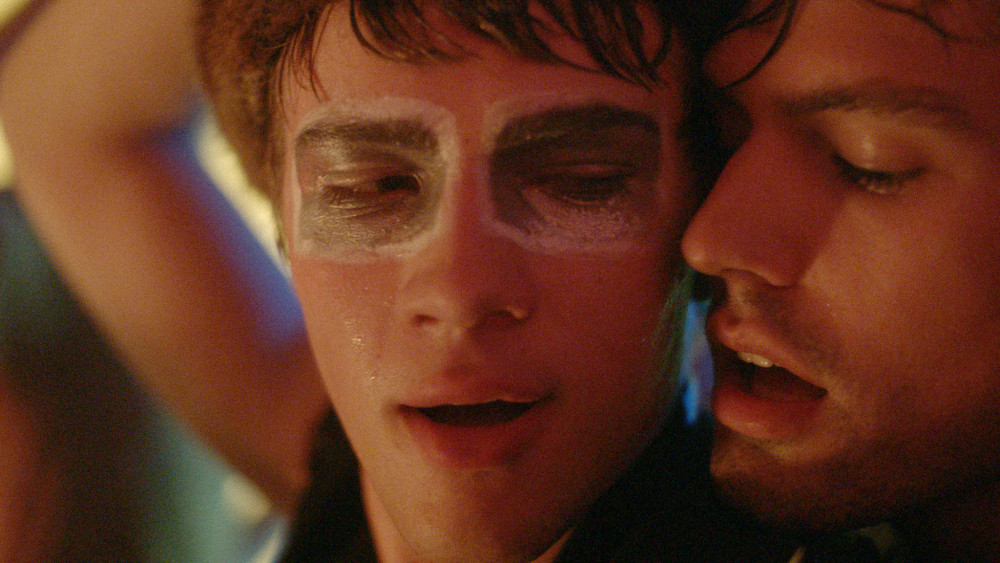
The queer experience differs from person to person, so much so that one encapsulating it all perfectly is impossible. Strangely enough, many coming-of-age films for individuals like myself often follow similar patterns, rarely offering surprises to break the mold. Closet Monster, Stephen Dunn’s directorial feature debut, isn’t all that interested in changing the story, but instead adds fantastical elements to a journey of self-discovery.
Coming to terms with one’s own queerness can be a trying experience, and Closet Monster nails that feeling by literally making its protagonist suffer through gut-wrenching pain every time he confronts his sexuality. In his youth, Oscar Madly (Connor Jessup) witnessed a hate crime that involved a pole being driven into a young gay man. Alongside the divorce of his parents and his father’s casually homophobic attitude, it’s a thought that haunts him in his teen years as he finds himself interested in his co-worker Wilder (Aliocha Schneider) and is the root of the self-loathing that propels the movie.
The concept of internalized homophobic being externalized as body horror—vomiting bloody hardware and bulging stomachs that immediately recall Alien and its chestburster—is a great one, both transformative events that leave their mark on an individual, figuratively and literally. And Closet Monster is consistent in its adoration of the genre it uses to explore Oscar’s coming-of-age: a young Oscar walks around with a wooden stake, his talking pet hamster (voiced by Isabella Rossellini of all people) is named Buffy, and he aspires to be a horror make-up artist and photographer. Even the actors who play his parents will be familiar to those fond of horror and sci-fi television (Warehouse 13’s Joanne Kelly and Hannibal’s Aaron Abrams).
But for all its love of horror, fantasy, and science fiction, it’s a film that’s surprisingly grounded in the reality of what it’s like to deal with the expectations of the world around you when they’re in direct contrast with what you’re feeling. Dunn and cinematographer Bobby Shore focus on depicting a level of intimacy that works beautifully, often allowing the viewer to understand what’s going through Oscar’s mind through visuals. It moves comfortably and confidently between loud, colorful sequences and quiet moments between family, some of which will be eerily familiar to every queer person who ever had masculinity thrust upon them without question.
In its approach to teenage sexuality and frustration, Gregg Araki is an easy influence to draw. Much of what makes Closet Monster work is its electric nature, with the uncertainty of queerness and all that baggage that comes with it working as a loaded gun. There’s a spontaneity to sensuality that moves through its every frame and the performances come across as naturally as can be, with Jessup keeping every moment—as ridiculous as some might seem—grounded. And in a similar way to Xavier Dolan’s earlier films, Stephen Dunn captures longing and sexual discovery with an aesthetic overload.
Almost as though in direct companionship with Heartbeats—which amusingly enough features Schneider’s older brother Niels Schneider as a similarly ambiguous object of interest —Dunn also utilizes color and music (Michael Gordon, Princess Century, Light Asylum, Ladytron all feature on the amazing soundtrack) to its fullest potential, though with a little less precision and coldness than Dolan. The sensation of a first kiss is one of the most impressive scenes the film boasts, dripping with arousal as the sound fades and the moment of spit-swapping intercut with a reversed video of water splashing against rocks.
“Am I a bad person?” Oscar asks at one point and, as heavy-handed as it might sound, it’s a question of self-loathing that many young queer people have had to ask themselves. Though the film arguably doesn’t allow its body horror strand to reach its fullest potential (and its last moments feel a little too clean-cut for its own good), Closet Monster still proves itself as an exciting debut. It’s sleek and cool to its very core, with editing that mirrors the anxieties of its protagonist with confidence, resulting in a work of art that gives every horror-loving queer kid who ever hated themselves a Boyhood of their very own.
—
Directed by Stephen Dunn; written by Stephen Dunn; starring Connor Jessup, Aaron Abrams, Joanne Kelly, Isabella Rossellini, Aliocha Schneider, and Sofia Banzhaf; 90 minutes.
Closet Monster will be playing in Miami during the MiFo LGBT Film Festival on Saturday, April 23rd, at 10:00 p.m. at Regal Cinemas South Beach. Strand has not announced theatrical distribution outside of festivals yet.



 Derek
Derek
 Isabelle
Isabelle